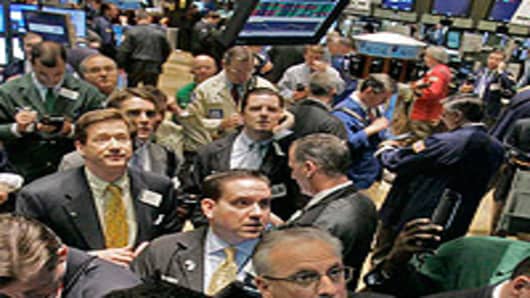In addition to signaling slow growth in the jobs market, the latest reading on unemployment reinforces the deep synergy between the Federal Reserve and the stock market.
The government reported Friday that the economy created a net of just 36,000 jobs in January, way below economist expectations of 145,000. At another time, such a dramatic miss might have triggered a selloff on Wall Street.
Instead, it merely hammered home the notion that the recovery was still in its early stages and that the Fed's backstopping of the equity markets through its quantitative easing programs will remain firmly in place until a whole lot more jobs are created.
Additionally, it removes worries that should the economic reports get too positive, it could encourage the Fed to step away and thus thwart the nearly 2-year-old stock rally.
"At the end of the day it's not enough to change what the Fed's doing," says Matthew Tuttle, president of Tuttle Wealth Management in White Plains, N.Y. "This is the third year of the presidential cycle, which is normally good anyway. Put QE2 on top of that and it's the presidential cycle on steroids."
The market, in fact, was slightly positive in afternoon trading, with some investors choosing to focus instead on the unemployment rate dropping to 9.0 percent, others looking at signs of economic recovery outside of jobs, and still others joining the chorus that the Fed will continue pumping money into the economy until the jobs and housing pictures improve.
So in view of how stoic investors have been since the Fed intervention began in early 2009, where even bad news is good news, a continued rise in stocks is not surprising anymore.
"Productivity and technology are really going to hinder employment status for a while. But that doesn't mean companies aren't going to continue to make money and be profitable and the economy will continue to grow," says Nadav Baum, executive vice president at BPU Investment Management in Pittsburgh. "That's the message you got today."
The other message flowing through the markets is that unless the Fed starts seeing unemployment around 8 percent, there isn't much chance that monetary policy is going to change.
Joe LaVorgna, chief economist at Deutsche Bank, said earlier this week that the Fed may start shrinking its balance sheet by mid-year but likely won't start raising rates until December, and then only incrementally into 2012.
Bill Gross, managing director at bond fund manager Pimco, told CNBC on Thursdaythat a speech from Fed Chairman Ben Bernanke sent a clear message that rates won't start moving higher until the jobs picture changes.
"We cannot consider the recovery truly established," says Jeffrey Cleveland, chief US economist at Payden & Rygel in Los Angeles. "We have high unemployment and low inflation—well below our target. In those conditions usually monetary policy is in the easy mode. We expect them to finish a full dose of QE medicine through June and not move on the fed funds rate anytime through 2011."
A year ago, market pros were voicing some of the same sentiments—that the economy was recovering, the stock market had seen its worst days and it was time to buy. The difference, though, is that people then were beginning to expect a rate increase.
This time around, sentiment has shifted toward the Fed not chancing a hike.
"The Fed isn't taking their foot off the pedal," says Emily Sanders, president of Sanders Financial Management in Atlanta. "We're advising our clients to participate in the equity markets, but to be prepared to make a shift if it looks like QE is coming to an end."
To be sure, some in the market wouldn't mind seeing the Fed pull away, though it would have to be accompanied by a much steadier economy.
"I would like to see the mechanics and mechanisms of the market work the way they're supposed to work," Baum says. "If that means that profitability and the other things that are supposed to drive rates up happen, then let them happen. We are well in the rebound at this point. Let the markets be markets."



